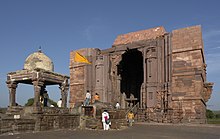Bhoja
Bhoja or Bhojaraja ( Sanskrit भोज Bhoja ) was an Indian king of Malwa in the first half of the 11th century. He was a great promoter of literature.
Life
Bhoja belonged to the Paramara dynasty in the kingdom of Malwa . He succeeded his father Sindhuraja to the throne around the year 1000 and fought several successful wars, especially against the Chalukya, and thus brought his empire to a prosperous period. Towards the end of his rule, however, he succumbed to attacks by the Chalukya and succumbed to a violent fever during a campaign. This was followed by turmoil of the throne, in which Jayasimha first prevailed, but was soon replaced by Udayaditya, who reorganized the empire. Both belonged to the close family of Bhoja.
Bhoja had dams and reservoirs built throughout the country and expanded the royal city of Dhar , building several temples and a Sanskrit school. He also founded the cities of Bhopal and Bhojpur .
Bhoja was a supporter of Sanskrit literature and wrote several works himself, in which he dealt with a wide variety of topics, such as alchemy , architecture , astronomy , legislation , iconography , philosophy , poetics , rhetoric , shipbuilding and yoga . Bhoja was a Shivait who took a dualistic position.
Works
Over 80 works are ascribed to King Bhoja, but it is believed that he himself could not have written so many works and that some of them came from his court scribes. The most important works include:
- Nāmamālikā (Lexicon)
- Rājamartaṇḍa (Commentary on Patanjali's Yogasutra )
- Rajamṛgaṅka (astronomy)
- Rāmāyaṇa-campū (version of the epic Ramayana )
- Śālihotra (horse breeding)
- Samarāṅgaṇa-sūtradhāra (architecture, iconography)
- Sarasvatī-kaṇṭhābharaṇa (poetics)
- Śriṅgāra-prakāśa (poetics, dramaturgy)
- Tattvaprakāśa ( Shivaitic philosophy )
- Yuktikalpataru (shipbuilding)
literature
- Ganga Ram Garg: International Encyclopedia of Indian Literature ; Delhi 1982. (p. 63)
- Benjamin Walker: Hindu World , Vol. 2, London 1968. Keyword: Paramāra (p. 186)
Web links
- King Bhoja - Biography (English)
| personal data | |
|---|---|
| SURNAME | Bhoja |
| BRIEF DESCRIPTION | Indian king of Malva |
| DATE OF BIRTH | 10th century or 11th century |
| DATE OF DEATH | 11th century |
